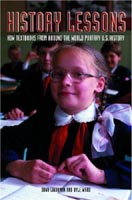History Lessons is really a collection of excerpts from foreign History textbooks and their take on particular events in US History. Namely, how the event affected their nation, what was their participation, how their textbook writers see it, etc. Besides collecting the pieces, the authors do preface each section or chapter on how much attention American schools currently give the event. For example, the Korean War is just lumped into the larger narrative of the Cold War while both Koreas have much more to say since the fate of their entire peninsula and culture was at stake. Ward and Lindaman also give the best translation they could find yet leave certain words or phrases in bold when it’s shaky or there is no English equivalent.
At first, the book was rather disappointing because it covers 50 events in chronological order starting from the Viking expeditions and doesn’t get interesting until the American Civil War for me. Pre-Civil War America is interesting but the majority of the material the authors use are from the US’s neighbors (Canada, Mexico and the Caribbean) or the UK. Their versions are interesting yet I was hoping to read what Japan, Russia, China or India tell their students about the nation’s founding.
Lessons picks up steam when you see entries on more current events: the Cold War, the Middle East since WWI and Free Trade. This is when non-Western nations jump into the fray. The North Korean version of the Korean War is amusing because every time Americans are mentioned, the term “bastards” is always present. If the people there weren’t starving to death, it would be funny. I’m also amazed Arabs would still study in the West after what they’re told in high school. If most Americans saw what is in Saudi textbooks, Israel would have carte blanche to do as they see fit in the region. In their defense, I think young people from any nation are cynical and know when they’re being lied to by their government, teachers, parents, clergy, etc. BS detectors aren’t exclusive to the Judeo-Christian cultures. I also sensed a pattern with Canada having this ongoing fear of the US absorbing them by force, economics or in death (nuclear war).

